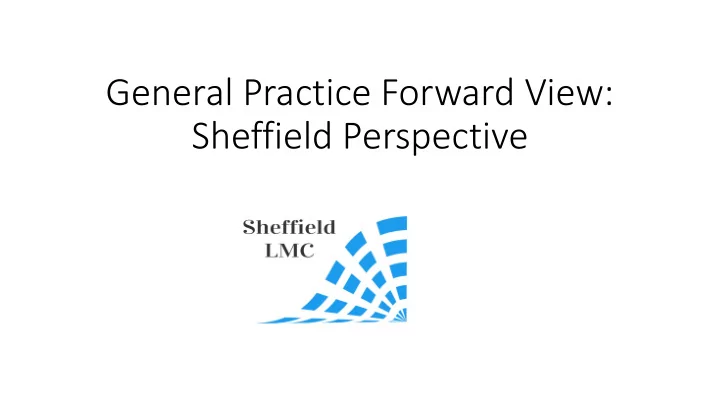

General Practice Forward View: Sheffield Perspective
GPFV commitment to General Practice • “One of the great strengths of general practice in this country has been its diversity across geographies and its adaptability over time. So one size will not fit all…” Simon Stevens • “There has been a steady rise in patient expectations, a target driven culture and a growing requirement for GPs to accommodate work previously undertaken in hospitals or in social care.” Arvind Madan
Local recognition of pressures affecting General Practice • Sheffield CCG Delivering the GPFV document recognises the pressures of: • GPs/PNs approaching retirement • Fewer GPs entering profession, more leaving early • Long hours and insufficient capacity • Reductions in funding • Transfer of workload from secondary to primary care • Increased administrative work • Increased number of patients with complex needs • Inequalities in health provision
Chapter 1 - Investment • Vulnerable practice funds 2016/17 • Practice resilience programme – linked to national criteria • LCSs recognising some of the workload shift from secondary care e.g. Anti-coagulant monitoring, DMARD monitoring, CASES • Rising costs of indemnity – winter indemnity scheme
Chapter 2 - Workforce • Supporting the partnership model • “It is … in the interests of GPs and practices to improve the relative attractiveness of partner and salaried positions… to incentivise partnerships and salaried commitments to practices on one hand we also want to create an alternative to … locuming…” • Sheffield has at least 11 GP vacancies and 8 PN vacancies, however, SCCG plan focuses on practice nursing and administrative/practice management roles • 5000 other staff including mental health workers and practice pharmacists • Sheffield has 32 training practices and the CCG would look to encourage more practices to train and retain workforce • Improved access to Occupational Health (Mental and Physical) for GPs
Chapter 3 - Workload • Releasing time for patients • Practice Vulnerability and Resilience funds • New contracts for hospitals to reduce the transfer of workload to general practice • CQC inspections
Chapter 4 - Practice Infrastructure • Premises “…we will invest in ‘at - scale’ project support.” GPFV • GP IT investment – Sheffield priorities • Share records between practices • Supporting remote working • CCG prescription ordering line • Business intelligence for New Care Models • On-line consultations • Premises • 113 properties in Sheffield • 43 converted premises • 7 Local Improvement Finance Trust buildings (usage 33-50%)
Chapter 5 - Care Redesign • “Support to strengthen and redesign general practice” GPFV • Integrate extended access with out of hours and urgent care services • Working at scale • Primary Care Access Hubs • New models of care e.g. Multidisciplinary provider contracts(MCPs) Super- partnerships, Primary and Acute Care systems (PACs) • Federated models
Sheffield Working at Scale • Sheffield “at scale” is based around a neighbourhood model • CCG has provided £1.50 per head 2016/7 and 2017/8 • CCG publishes a Neighbourhood newsletter • PCS run Neighbourhood Learning Networks • Virtual Ward, use of paramedics for urgent visits • The Foundry, company limited by shares – Advance Training Practice scheme
Integrating General practice in the Sheffield health and social care economy: STPs and ACPs Sheffield CCG Joint Commissioner Sheffield City Council STH Accountable Care Sheffield Children’s Hospital Partnership Board PCS SHSCT Sheffield City Council (social care) ACP Delivery Group General Practices Health and Wellbeing Boards
Key Principles for Future General Practice and its role in the delivery of Primary Care in Sheffield • General Practice and its individual practice units are the cornerstone of Primary Care and fundamental to the survival of the NHS. • The role of the GP should be reaffirmed as a generalist managing complexity, uncertainty and undifferentiated illness in the context of continuity and ongoing care and applying evidence based practice within the context of the individual patient. • The practice based list is fundamental to the safe delivery of care to maintain the doctor/patient relationship and family centred medicine. • General Practice in Sheffield, whether operating in individual units or at scale, should deliver high quality, consistent and co-ordinated healthcare which is respondent to variations in local needs and seeks to tackle health inequalities. • The independent contractor status is valued and should be preserved wherever partnerships remain committed to do so, whilst recognising the need for practices to adapt to and be integrated into wider Primary Care delivery, coordinated at scale, within an Accountable Care System. • Practices that are struggling or that wish to move away from the independent contract should be supported by a Primary Care response that enables them to deliver services that achieve the agreed outcomes for their population, and that are integrated within the wider system approach. • Transformation in Primary Care requires wider system support and investment as activity shifts from hospitals into the community. This needs to be through a mixture of a transfer of resource directly into General Practice and Primary Care, additional wrap around services and community development, and flexibility in the way organisations work to allow greater integration. • In recognising the need to attract more GPs and allied health professionals into primary and community care, practices should be supported to overcome workforce recruitment and employment challenges through greater workforce diversification. • Career progression in General Practice should be more clearly defined, supporting junior GPs to make the right decisions and develop themselves, whilst ensuring the skills and experience of senior GPs are targeted to where they can have the greatest impact, including training in overseeing a team of allied health professionals as a senior clinical decision maker. • The Neighbourhood models should look at appropriate units of wrap-around services to support local groups of practices working together at their own defined pace with support from a citywide provider organisation. • Resource allocation should recognise the importance of the practice unit in delivering safe, sustainable and value-for-money general practice services in primary care transformation.
Recommend
More recommend